Property / Real Estate / Condo Fraud Lawsuit in Thailand for Foreigner-Expat: Legal Protection in Phuket, Pattaya, Bangkok, Chiang Mai, Samui, ETC.

As Thailand’s real estate market continues to attract local and international investors, cities like Phuket, Pattaya, Bangkok, Samui, etc. have unfortunately become hotspots for Property fraud. Fraudulent transactions can leave buyers with significant financial losses, especially if they involve fake title deeds, unregistered land, or deceptive property development projects.
If you find yourself a victim of property fraud in Thailand, it is essential to seek legal action immediately to safeguard your investment and prevent further complications. As the professional property lawyer in Thailand, the House Condo Lawyer Team specializes in guiding clients through the process of filing property fraud lawsuits.
With over 15 years of experience in real estate law and litigation, the House Condo Lawyer Team has handled thousands of real estate cases, such as Property fraud, Payment refunds, Consumer cases, etc., for both Thai and foreign clients, involving damages amounting to billions of baht. One of these cases had the highest value over 400 Million Baht. In every case, we stand by our clients until the very end, ensuring they receive compensation and justice. Let us be your trusted partner in alleviating your distress and protecting your rights.
Contact US today for a free consultation for the First Time!!
- Property / Real Estate / Condo Fraud Lawsuit in Thailand for Foreigner-Expat: Legal Protection in Phuket, Pattaya, Bangkok, Samui, ETC.
- Common Types of Property Fraud in Thailand
- How Foreign Investors Fall Victim to Property Fraud
- Civil or Criminal Case? & Statute of Limitations
- Public Fraud in Real Estate: Legal Perspectives and Key Considerations
- Real Case: Property Fraud in Phuket
- Filing a Complaint with the Office of the Consumer Protection Board (OCPB) in Thailand
- Protecting Yourself from Public Fraud in Real Estate
- Why Choose “House & Condo Lawyer”? – Your Trusted Partner for Professional Real Estate Law Services in Thailand.
- Our Lawyer Team
- Montira Kiatsunthorn (Lawyer Pam)
- Kanyapas Tantivatanasatien (Lawyer Vivian)
Our Services – Click to Read more >>
- Property Living & Consultant in Thailand
- Property & Real Estate Legal Services (English Speaking)
- How to own / invest the real estate in Thailand, 100% Legally
- Due Diligence for Property Transaction : Buy – Sale – Rent etc.
- Property / Real Estate Fraud Lawsuit in Thailand
- Escrow Account in Thailand for Real Estate & Property Purchase Transaction, or Lawsuit
- Thailand Visa & Immigration Services
- Refund Property Downpayment from the Property Developer in Thailand : Condominium Unfair Contract, Delay & Poor Construction, EIA not pass, or even change your mind not to buy!!
- Business Match Maker & Consultant : Experience & Expertise in Real-estate, Hotel, Information Technology, Commercial & Medical Business
- Business Registration and Corporate Services
- Accounting & Tax Planning
- Family Legal Services : Marriage Registration. Prenuptial Agreement, Filing of Contested and Uncontested Divorce, etc.
- Last Will and Testament
- Notarial Service Lawyer
- Translation and Legalization Services
- Consumers Rights Protection Lawsuits
- Legal Service for investing & buying the NPA Property
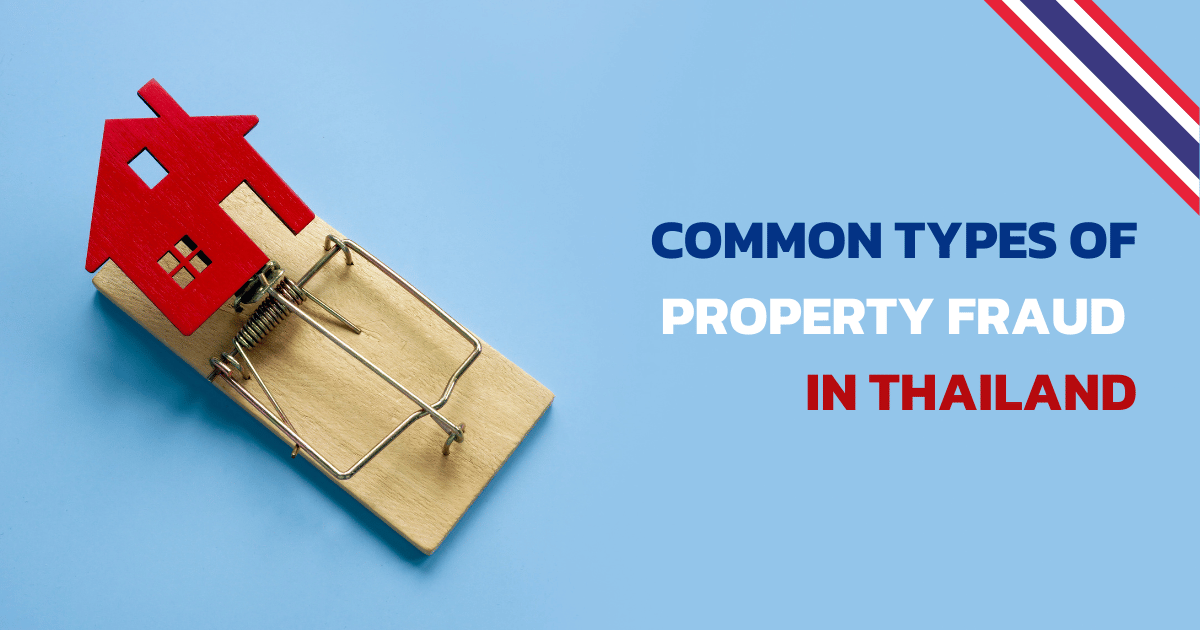
Common Types of Property Fraud in Thailand
Foreign investors often encounter several types of property fraud in Thailand, each of which can lead to financial loss or legal issues. Here are some of the most common schemes used to defraud foreign buyers:
- Fake Title Deeds Fraudsters may provide falsified or incomplete title deeds to foreign buyers. This is one of the most common types of property fraud, where the seller does not actually own the property, or the title is forged. In many cases, the showed ownership document may not be a Title deed, but other possession document that cannot be transferred or sellable. Foreigners, unfamiliar with Thailand’s land registration system, are particularly vulnerable to this type of scam.
- Forbidden Land Sales or Untransferable Property Some fraudsters sell land or properties that cannot be registered with the Thai Land Department. In Thailand, some ownership documents cannot be sold or transferred to another person, but only their family. Some fraudsters claim these documents as a Title deed. These Forbidden land / Property can cause significant legal issues, as foreign investors may find out later that the land or property is not legally transferable or that ownership disputes exist.
In certain areas, construction is regulated by zoning laws or urban planning regulations, which prohibit the building of certain structures, such as those exceeding height limits or any construction within designated flood zones or on slopes steeper than 30 percent. Structures that do not comply with these regulations cannot be registered with the Land Office or local district authorities. If such violations are discovered, the authorities may order the demolition of the unauthorized structures. Furthermore, if it is later determined that the property is located in a flood-prone area or designated water catchment zone, it could result in significant damage to the lives and property of the buyers, or their family. - Condominium Scams Condominium fraud happens when developers sell units in projects that either do not have the EIA or Construction approval or will never be completed. Many foreigners are drawn to the idea of owning a condo in Thailand, especially in tourist-heavy areas like Phuket and Pattaya, but end up losing their deposits or payments to fraudulent developers.
Based on our recent experience, some abandoned condominium projects have been manipulated in a fraudulent scheme by foreign developers who target their fellow nationals. These developers sell units to unsuspecting buyers, abscond with the funds, and subsequently become untraceable. Victims have attempted to seek justice through the courts in an effort to recover their money. However, it was discovered that the very same projects had been sold to other companies, who in turn relaunched sales without any regard for the previous victims.
The new purchasers of the project, mostly the foreign investors, have renovated the sales office, erected fencing around the construction site, and put up new signage. However, upon closer inspection, it becomes evident that no actual construction is taking place within the site. This strongly indicates that the intent behind acquiring these abandoned projects is to continue the scheme by reselling them to foreign buyers. We urge all potential buyers to exercise extreme caution. - Overpriced Property Sales Foreign buyers are sometimes quoted inflated prices by sellers or real estate agents who take advantage of their unfamiliarity with the local market. In some cases, agents work with developers or sellers to overcharge foreign buyers, knowing they lack the local knowledge to negotiate a fair price.
Moreover, in many case, property developers may impose unreasonable additional charges, particularly in projects that are not part of “Land Allocation Law” or “Subdivision Law” or are constructed in violation of regulations. This leaves buyers unprotected under the law. These charges may be presented under various pretenses, such as management fees, road maintenance fees, under-the-table payments to local officials or police, costs for constructing and maintaining access roads to the project, as well as fees for installing electrical wiring and water supply systems. All of these expenses are often fabricated to unjustly collect additional payments from buyers. Unfortunately, buyers may find themselves powerless to take legal action, as they were aware from the outset that the house or project was not in compliance with legal requirements. - Nominee Structures for Land Ownership As foreigners cannot directly own land in Thailand, some property fraud involves setting up illegal nominee structures. In this scheme, a foreign buyer is led to believe they can own land by registering it under a Thai national, who acts as a nominee. This practice is illegal and can lead to the foreigner losing their investment if the nominee claims ownership or if authorities investigate the arrangement.
In a real case that occurred, a foreign client purchased land to build a house, with the property being held in the name of a Thai national arranged by a broker. Over time, the nominee passed away, and the land, along with the house, was transferred to the nominee’s legal heirs, who then proceeded to evict the foreign owner from the property. Additionally, in several cases, foreign clients were unable to locate the Thai nominee holding the property on their behalf. In some instances, it was discovered that the property had already been sold or transferred to multiple parties without the foreign owner’s knowledge or consent.
Contact us today for a free consultation for the First Time!! if you suspect you’ve been a victim of property fraud or need assistance with a real estate transaction in Thailand. With our expertise in property fraud lawsuits, we will help you navigate the legal process and ensure your rights are protected.
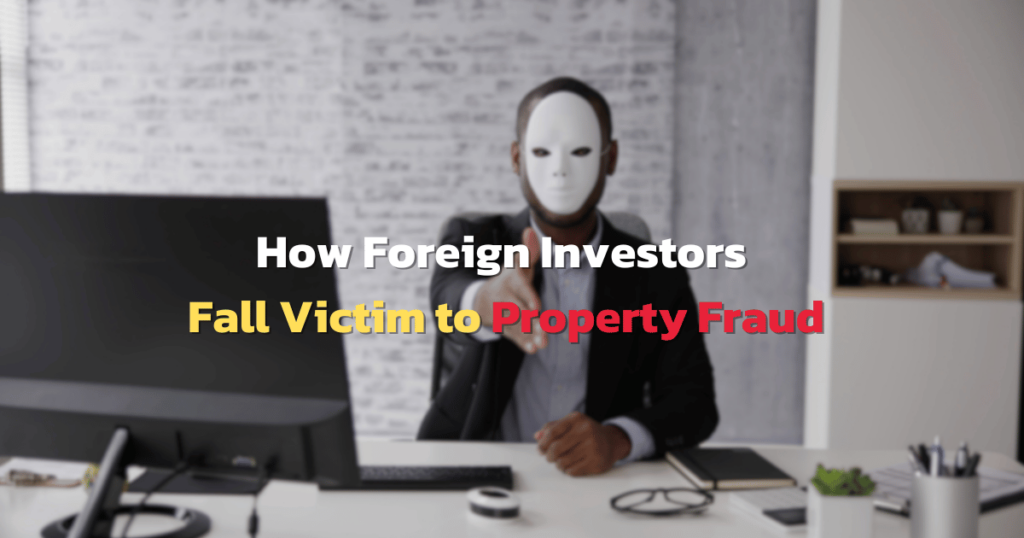
How Foreign Investors Fall Victim to Property Fraud
Many believe that foreign investors are often susceptible to property fraud in Thailand due to a lack of local knowledge and unfamiliarity with Thai property laws. While this is partly true.
Here’s how these schemes typically unfold:
Do you find yourself a victim of property fraud in Thailand? Contact US today for a free consultation for the First Time!!
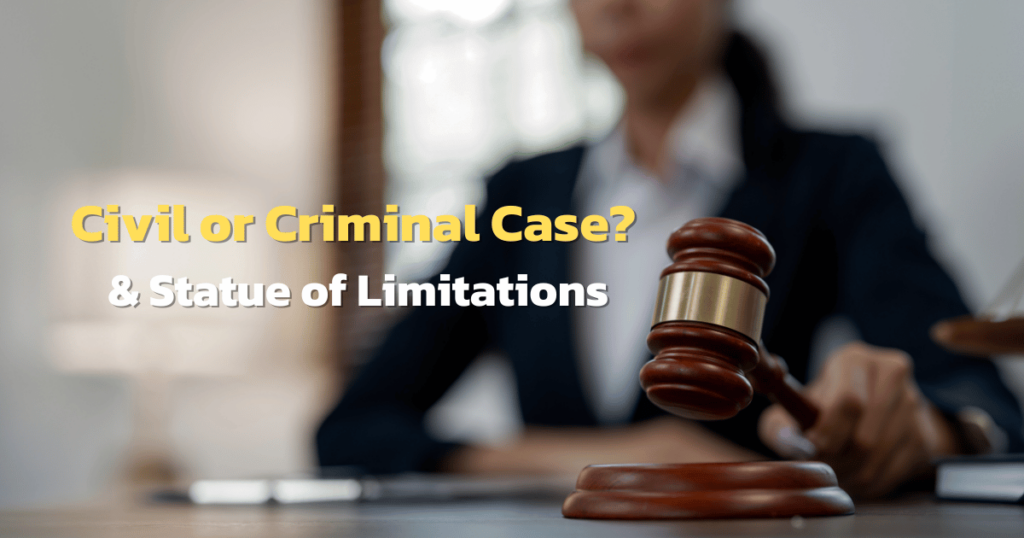
Civil or Criminal Case? & Statute of Limitations
Civil or Consumer Case
Typically, a breach of a sale and purchase agreement for real estate between a buyer and a developer is classified as a civil case, specifically a consumer case, with a statute of limitations of 10 years. Most cases of this nature involve situations such as the buyer being unable to secure financing and requesting a refund of the down payment, the developer failing to complete construction and handover by the agreed deadline, or the developer delivering a substandard product. These types of cases generally involve only the buyer and the developer, and are characterized by a breach of contract.
The Consumer Case Procedure Act B.E. 2551, Section 3, states that “consumer cases are civil cases.” Therefore, the statute of limitations under the Civil and Commercial Code must be applied by analogy. According to Section 193/30 of the Civil and Commercial Code, “If not specifically provided otherwise in this Code or other laws, the statute of limitations shall be 10 years.”
Criminal Case
In many cases, especially consumer cases involving real estate or real estate fraud, such matters may also constitute criminal cases if the seller or developer had the intent to deceive from the outset. If multiple victims are involved, the case may fall under “fraud against the public,” which carries severe penalties and is non-compoundable (cannot be settled by mutual agreement).
(In Thailand, authorities generally apply this classification if there are more than 10 victims or damages exceeding 30 million baht.)
Fraud cases are considered criminal offenses, where an individual, with fraudulent intent, deceives others by providing false information or concealing the truth that should be disclosed to obtain property from the victim or a third party, or causes someone to make, withdraw, or destroy documents of title. The fraudulent intent must be present from the beginning.
As for the question of the statute of limitations for fraud cases, it is divided into two periods:
- Statute of limitations for filing a complaint: The victim must file a complaint or take legal action within 3 months from the time they became aware of the offense and the identity of the offender. Failing to do so will result in the expiration of the criminal statute of limitations.
- Statute of limitations for prosecuting the offender: Once a complaint has been properly filed, the offender must be prosecuted, or the case must be brought to court within 10 years from the date the offense was committed.
Is your case civil or criminal? Contact us for a free consultation for the First Time!!
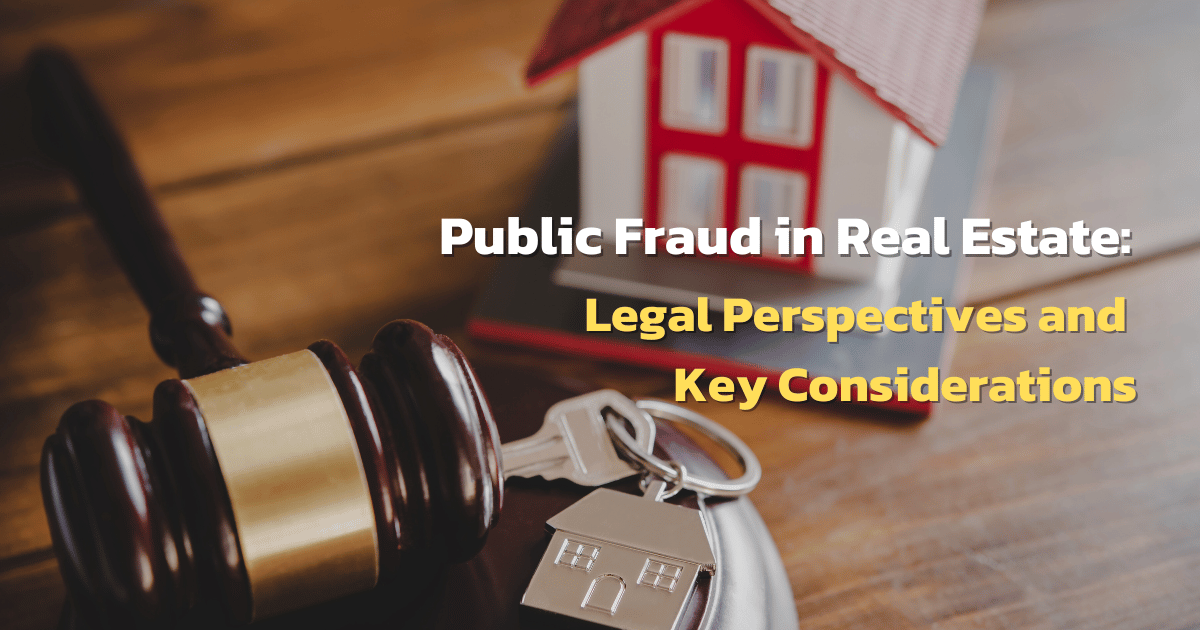
Public Fraud in Real Estate: Legal Perspectives and Key Considerations
Public fraud is a serious criminal offense under Thai law, and its application in real estate fraud can have severe consequences for those involved. This type of fraud occurs when a perpetrator deceives multiple victims, typically by offering false promises or misrepresentations about property sales or development projects. Given the rise of foreign investment and large-scale real estate projects in Thailand, public fraud in real estate has become a critical issue for both local and international buyers.
What Constitutes Public Fraud in Real Estate?
In the context of real estate, public fraud generally involves a developer, seller, or real estate agent making false claims about the ownership, legal status, or development progress of a property to multiple buyers. This can include selling units in unapproved condominium projects, misrepresenting land ownership, or using forged documents, such as fake title deeds.
If the deception affects a large number of people, the case can be classified as fraud against the public, or “ฉ้อโกงประชาชน” under Thai law. This type of fraud is especially concerning in real estate, where victims may invest significant sums of money only to discover that the property either doesn’t exist, is illegally developed, or the title is not clear.


Legal Framework for Public Fraud in Thailand
The Criminal Code of Thailand, specifically Sections 341 and 343, which specify the penalties for fraud and aggravated fraud, governs public fraud:
- Section 341 defines basic fraud as any act of deceit or false representation to gain property from another person. The punishment for basic fraud is imprisonment for up to three years or a fine of up to 6,000 baht, or both.
- Section 343 addresses fraud against the public and stipulates that if the fraud involves multiple victims or is perpetrated in a manner that affects the public, the penalty is increased. The punishment for public fraud can be imprisonment for up to five years or a fine of up to 10,000 baht, or both.
Additionally, the Consumer Protection Act and other civil laws may apply to real estate transactions, but when the fraud involves multiple victims, criminal charges for public fraud take precedence.
When Does Real Estate Fraud Become Public Fraud?
For a case to be classified as public fraud, certain criteria must be met:
- Multiple Victims: Fraud must affect more than one person. In Thailand, cases involving more than 10 victims are often treated as public fraud.
- Large-Scale Financial Losses: If the total damages exceed 30 million baht, authorities may consider it as public fraud.
- Intent to Defraud: The perpetrator must have had fraudulent intent from the beginning, deceiving the victims by making false claims about the property or its legal status.
For example, if a developer sells units in a condominium project that has not received approval from the Thai government, but advertises it as a legal and secure investment, this could be considered public fraud, especially if many buyers are affected.
Key Examples of Public Fraud in Real Estate
- Unapproved Condominium Projects: Developers may offer pre-sale units in projects that are not legally approved. Buyers are led to believe that the project is progressing as planned, only to find out later that it lacks the necessary permits.
- Misrepresented Land Sales: Sellers may offer land for sale that they do not legally own, using forged or falsified title deeds to deceive buyers. This is particularly common in high-demand areas like Phuket, Pattaya, and Bangkok.
- Non-Existent Projects: In some extreme cases, scammers may sell property in development projects that do not exist at all, collecting deposits and payments from numerous buyers before disappearing with the funds.
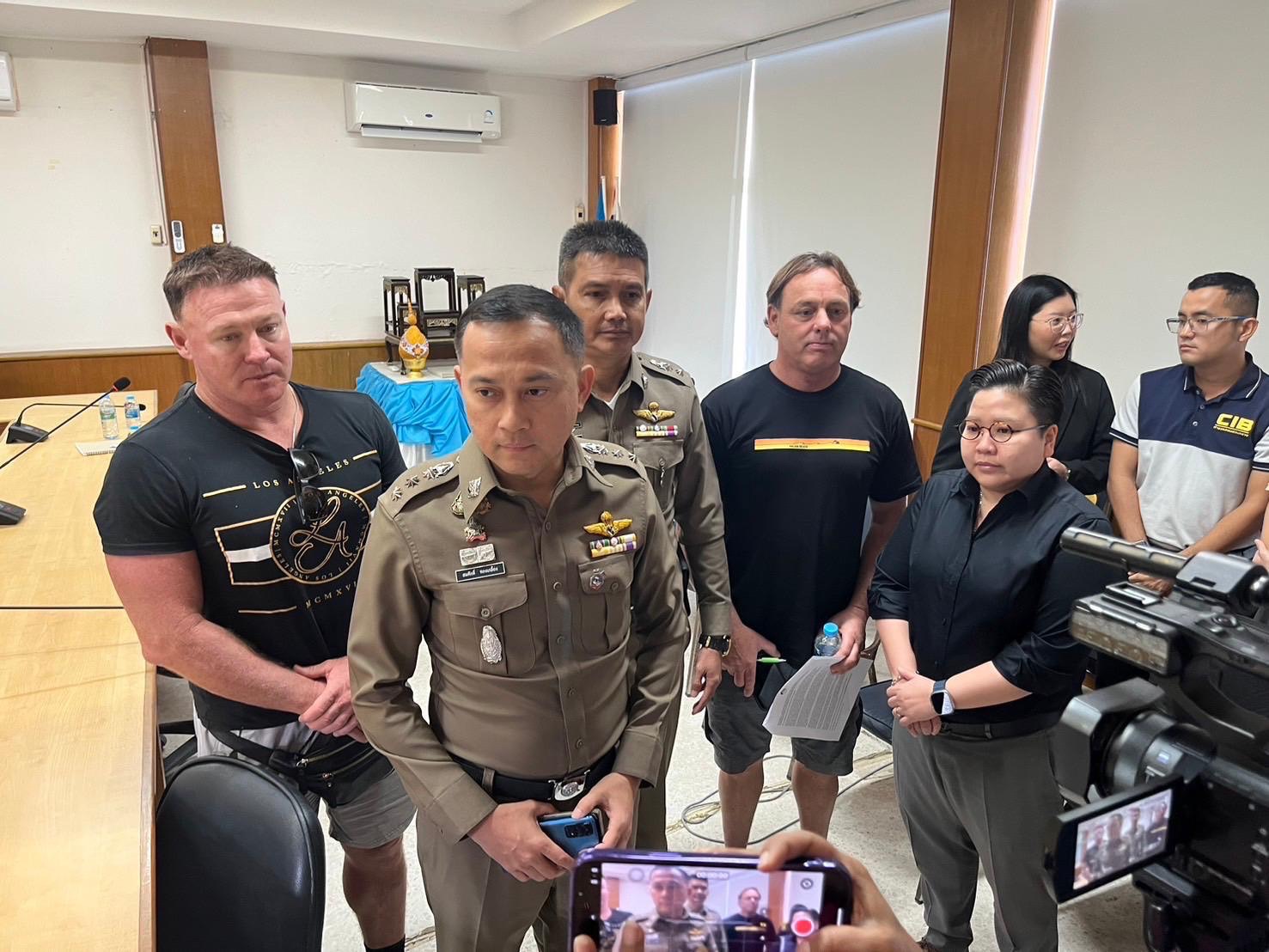

Real Case: Property Fraud in Phuket
In this case, the House and Condo Lawyer team has assisted our Australian client in filing a criminal complaint for fraud against the project developer, The Peaks Residences, whose construction license and land ownership documents were revoked due to overlapping with forest reserve land. Our client had already pursued a civil case to its conclusion, and a settlement agreement had been reached. However, the developer failed to comply with the settlement terms. Further our investigation revealed that the developer’s company no longer holds any enforceable assets and cannot be contacted or traced, demonstrating clear fraudulent intent.
In light of these developments, our client and the legal team have coordinated with the Central Investigation Bureau (CIB) to file a formal complaint against the developer. We are aware of a significant number of other victims, with damages amounting to several hundred million baht, who have not received compensation or accountability from the developer.
Since the majority of the victims are foreign nationals, initial reports to local authorities were rejected, and the victims were advised to pursue a civil case or contact the Office of the Consumer Protection Board (OCPB), without the filing of any criminal charges for fraud. Therefore, in accordance with the legal process, the Central Investigation Bureau, along with the client and our legal team, have proceeded to file criminal fraud charges in the jurisdiction where the incident occurred. This aims to consolidate the victims who have yet to be compensated to either pursue a class action or file criminal charges for ‘fraud against the public,’ which is a more serious offense.
If you have suffered damages from this same project, whether you have already filed a civil lawsuit or not, we encourage you to contact us, the House and Condo Lawyer team, to join the criminal fraud case against the developer. This will add significant weight to your case and strengthen your claims for compensation and justice.
Please send your contract, proof of payment, and contact information to Lawyer Montira : Montira@housecondolawyer.com or admin@housecondolawyer.com
The following is the news content in Local Media;
Source: Khaosod English https://www.khaosodenglish.com/featured/2024/09/04/australians-win-civil-case-now-seek-criminal-charges-in-phuket-condo-scam
Yes, you can find this news about the same developer across various media outlets in Thailand. Let us assist you through this challenging time with our experienced lawyers who have handled similar cases before.
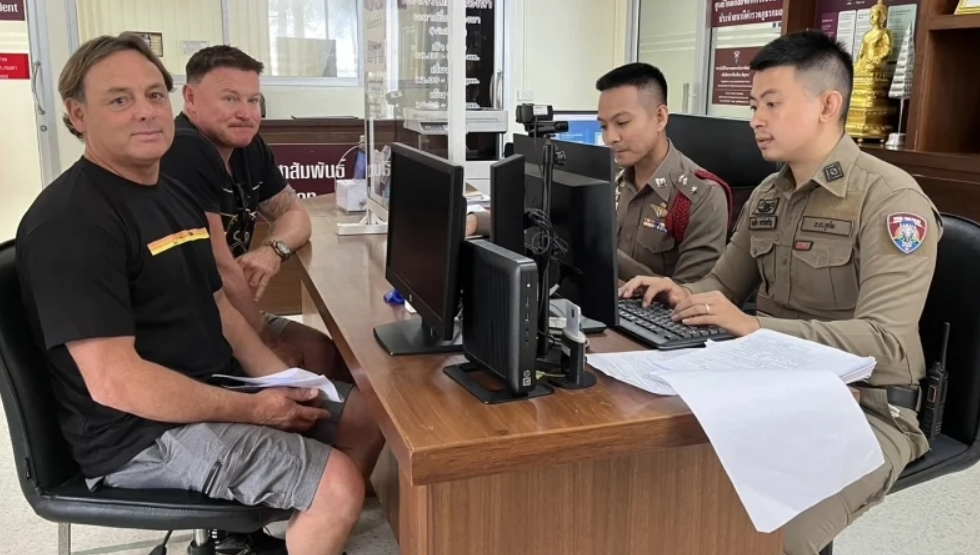
AUSTRALIANS WIN CIVIL CASE NOW SEEK CRIMINAL CHARGES IN PHUKET CONDO SCAM (Click to Read More!!)
Source: Khaosod English
PHUKET — Two Australian men filed a complaint on Tuesday at Kamala Police Station in Phuket against the company owning The Peaks Residences project for fraud. They had paid over 5 million baht for a condominium unit but did not receive the room as per the contract. They won a civil court case but have not received any compensation.
On September 4, the Central Investigation Bureau (CIB) revealed that officers received a complaint from Australian nationals against Kata Beach Company, the owner of The Peaks Residences project, at Kamala Police Station in Phuket Province. The Australians had won a civil case against the company for fraud but had not received any compensation.
The CIB stated, “If anyone has been affected and is a victim of this project, please come forward to report it. This will help expand the case for multiple victims, ensuring fair treatment for those who legally purchased real estate in Phuket and Thailand, demonstrating that individuals are protected equally by law regardless of nationality.”
On September 3, two Australian men filed a complaint with Police Colonel Somsak Thongkliang, Superintendent of Kamala Police Station. They reported buying a condominium unit in The Peaks Residences project for about 6 million baht and had already paid over 5 million baht but did not receive the unit. They then sued in civil court and won, but still haven’t received any compensation from the project owner.
An investigation by the Consumer Protection Police Division (CPPD) found that Kata Beach Company sold land without proper titles to many Thai and foreign buyers but couldn’t complete construction due to illegally issued building permits from the start.
Under Thai law, condominium businesses must build on land with proper titles only. The company’s actions were deemed a misrepresentation of facts to obtain reservation fees or contract payments worth millions of baht per case.
The project owner, Kata Beach Company Limited, claimed that when their permit was revoked, they couldn’t continue construction and offered victims the option to buy units in other projects. Years later, project representatives informed victims that construction couldn’t be completed on schedule and advised them to seek refunds directly from Kata Beach Company.
Later, Kata Beach Company representatives attempted mediation with installment payments, but when payment was due, there was no contact. The Australian clients investigated and found the company had insufficient assets to repay debts, leading them to believe it was a deception to avoid responsibility.
The CIB noted that consumer protection laws strictly regulate real estate development businesses in terms of contracts and advertising. Failing to deliver properties as agreed in housing projects is considered a fault of the operator, who must be directly responsible to consumers. If there’s evidence of fraud or deception, it could also constitute criminal offenses against the victims.
Victims must receive compensation for damages without discrimination based on nationality under Thai law. Such actions by operators severely damage the reputation of Phuket Province and Thailand. Police Colonel Somsak stated that Kamala Police Station has received the complaint and will conduct further investigations.
Contact us today for a free consultation if you are a victim of property fraud or need assistance with
a real estate transaction in Thailand. With our expertise in property fraud lawsuits, we will help you navigate
the legal process and ensure your rights are protected

Filing a Complaint with the Office of
the Consumer Protection Board (OCPB) in Thailand
Often, when you realize you’ve fallen victim to real estate fraud and approach local authorities, you may be told, “This is a civil matter; we cannot proceed with criminal charges,” and are advised to file a complaint with the Office of the Consumer Protection Board (OCPB). In some cases, even representatives of the developer or party at fault may challenge you to file your complaint with the OCPB. This naturally raises serious concerns for the victims, who wonder why this is the case and whether the OCPB can truly provide any meaningful assistance. The question remains—what can you do when local authorities, possibly influenced by vested interests, refuse to take on your case? What steps should you take next?
In Thailand, The procedures undertaken by the OCPB typically take a lengthy time, usually around 5-6 months. The OCPB does not have the authority to enforce compliance by the developer or producer. Its power is limited to calling parties for mediation and filing lawsuits on behalf of consumers if the developer or producer is clearly at fault for violating consumer rights. However, if the consumer is the one in breach of the contract, or if the OCPB does not find the developer or producer to be clearly at fault, the OCPB will not proceed with a lawsuit. In such cases, the consumer will need to pursue legal action independently (which could lead to significant delays).
Key Caution:
One crucial point to be aware of is that filing a complaint or entering into an agreement at the OCPB does not stop the statute of limitations from running. Even if an agreement is made for the developer or seller to take responsibility or make repairs, this does not constitute an acknowledgment of debt. It is merely a written statement or testimony in response to the complaint filed with the OCPB, which is an administrative body established to protect consumers. This principle is affirmed by Supreme Court Judgment No. 7053/2540.
Our Recommendation:
If your dispute involves a local individual or company, and you cannot gather a large number of victims, the OCPB process may take too long or could be delayed by the opposing party until the statute of limitations expires. Particularly in cases where there are suspicions of fraud, we advise you to file a complaint with the police. If the local police refuse to accept the complaint, you should consult a lawyer to assist you in filing a complaint before the statute of limitations expires.
In civil matters, we strongly recommend that you consider pursuing legal action through the courts before the statute of limitations runs out.
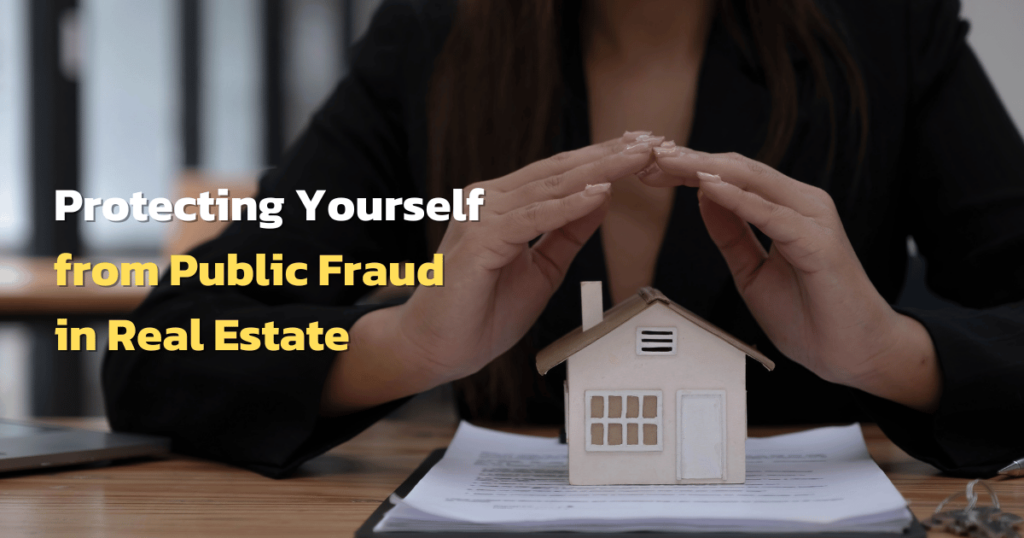
Protecting Yourself from Public Fraud in Real Estate
To avoid falling victim to real estate fraud in Thailand, especially public fraud, it is essential to take certain precautions:
- Conduct Due Diligence: Always verify the legal status of the property with the Land Department and ensure the seller or developer has the right to sell. For off-plan projects, check that the developer has obtained the necessary permits.
- Hire a Professional Lawyer: A qualified real estate lawyer can be your representative to negotiate the deal, to help review contracts, to verify title deeds, and to ensure that the transaction complies with Thai law. This is particularly important for foreign buyers, who may be unfamiliar with local property regulations.
- Be Skeptical of Unusually Low Prices: If a deal seems too good to be true, it probably is. Be wary of projects or properties being sold at prices far below market value, as this is often a sign of potential fraud.
- Check Developer Track Records: Before investing in a condominium or housing development, research the developer’s history and reputation. If the developer has been involved in previous lawsuits or complaints, proceed with caution.
Contact us today for a free consultation if you suspect you’ve been a victim of property fraud or need assistance with a real estate transaction in Phuket, Bangkok, or Pattaya. With our expertise in property fraud lawsuits, we will help you navigate the legal process and ensure your rights are protected.

Why Choose “House & Condo Lawyer”? – Your Trusted Partner for
Professional Real Estate Law Services in Thailand.
With over 15 years of experience in real estate law and litigation, House Condo Lawyer Team has handled thousands of real estate cases such as Property Fraud, Payment Refund, Consumer Cases, etc., for both Thai and foreign clients, involving damages amounting to billions of baht. One of these cases had the highest value over 400 Million Baht. In every case, we stand by our clients until the very end, ensuring they receive compensation and justice. Let us be your trusted partner in alleviating your distress and protecting your rights.
Our Services
- Property Living & Consultant in Thailand
- Property & Real Estate Legal Services (English Speaking)
- How to own / invest the real estate in Thailand, 100% Legally
- Due Diligence for Property Transaction : Buy – Sale – Rent etc.
- Property / Real Estate Fraud Lawsuit in Thailand
- Escrow Account in Thailand for Real Estate & Property Purchase Transaction, or Lawsuit
- Thailand Visa & Immigration Services
- Refund Property Downpayment from the Property Developer in Thailand : Condominium Unfair Contract, Delay & Poor Construction, EIA not pass, or even change your mind not to buy!!
- Business Match Maker & Consultant : Experience & Expertise in Real-estate, Hotel, Information Technology, Commercial & Medical Business
- Business Registration and Corporate Services
- Accounting & Tax Planning
- Family Legal Services : Marriage Registration. Prenuptial Agreement, Filing of Contested and Uncontested Divorce, etc.
- Last Will and Testament
- Notarial Service Lawyer
- Translation and Legalization Services
- Consumers Rights Protection Lawsuits
- Legal Service for investing & buying the NPA Property
Our Lawyer Team

Montira Kiatsunthorn (Lawyer Pam)
HEAD OF CRIMINAL LAWSUIT & PROPERTY LAW
Education & Qualifications
- Master of Laws (LL.M. in International Trade Law) University of Essex, UK
- Bachelor of Laws (LL.B.) Faculty of Law, Thammasat University, Bangkok
- Attorney License (Thailand)
- Notarial Services Attorney License
Areas of Legal Practice and Specialization
- Criminal Offence Procedure from law enforcement level to court’s litigation
- Legal and Government Affairs
- Business Disputes Resolutions
- Listed company secretarial filing
- Real-Estate and Property lawsuits and transaction
Experiences – Head of Legal & Corporate Lawyer & Consultant
- KPN Groups
- Raimon Land Public Company Limited
- TOA Paint (Thailand) Public Company Limited
- Siam Makro Public Company Limited
- Pace Development Corporation Public Company Limited
- Ananda Development Public Company Limited
- PAE (Thailand) Public Company Limited
Montira@housecondolawyer.com

Kanyapas Tantivatanasatien (Lawyer Vivian)
LAWYER & PARTNER
Education & Qualifications
- Bachelor of Laws (Honor), Chulalongkorn University (L.L.B )
- Master of Public Policy, University of Sydney, Australia (M.P.P)
- Bachelor of Political Science (Honor), Chulalongkorn University (B.A.Pol.Sci)
- Attorney License (Thailand)
- Notarial Services Attorney License
Areas of Legal Practice and Specialization
- Legal Consultation on real estate and
property laws. - Real Estate Business Contracting Specialist.
- Attorney-at-laws, on trustee and estate settlement.
- Property Transaction and Negotiation.
Experiences
- Foreign Security Committee to lead consultant of Deputy Prime Minister.
- Head of Business for corporate Real Estate /Property Agency .
- Property Consultation Australia and Thailand.
- Business Consultation for healthcare business groups.
- Legal Consultation on business and estate laws.
Kanyapas@housecondolawyer.com
Contact US today for a free consultation for the First Time!!

